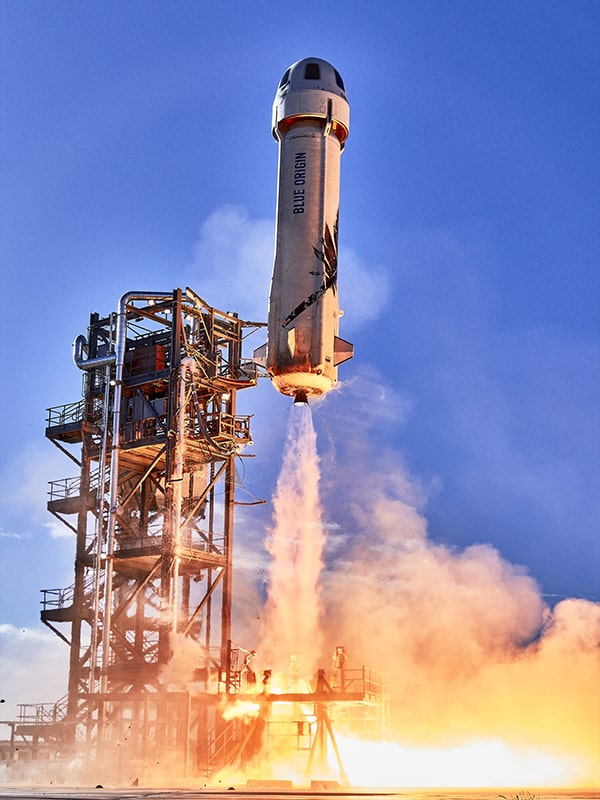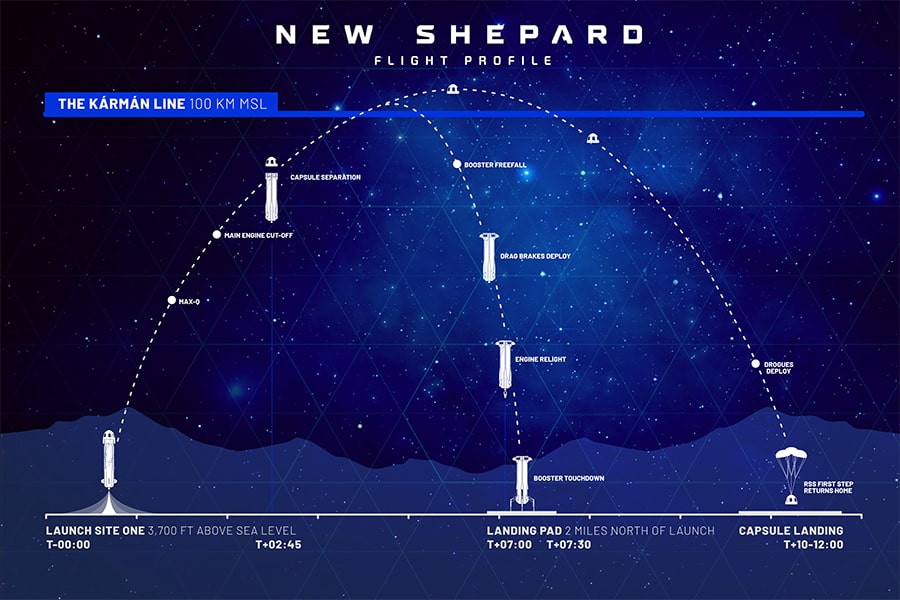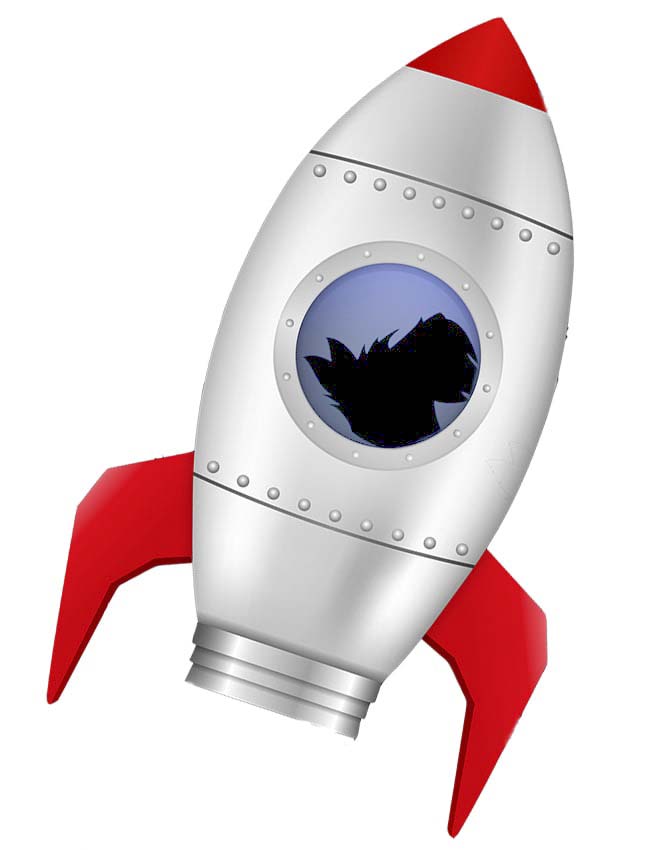Upon Re-Entry: A Post-Space Q&A with Glen de Vries
By Michael Henninger
Media Inquiries- University Communications & Marketing
- 412-268-2902
Glen de Vries prepared his entire life for this moment.
On Wednesday, Oct. 13, the Carnegie Mellon University trustee and alumnus and co-founder of Medidata Solutions traveled into space aboard Blue Origin's New Shepard Spacecraft. A lifelong fascination with all things space-related culminated in the flight, just the vehicle's second to carry humans.
"Trying to be an astronaut through fairly conventional means had passed by a long time ago. I was very focused on molecules and health," de Vries said. "To be fortunate enough where I could actually make this happen is an unbelievable opportunity. I've spent years talking about the need for equity and access in the world of health care, and I think space needs to be democratized in the same way."
In 60 years, fewer than 600 people have been to space. de Vries said the next 6,000 might come much quicker.
"I really feel like we're on the knee of the curve," he said. "It's thrilling to think about where this curve leads us. What emerging behaviors come out of that ecosystem, where more scientific experiments can take place in microgravity. I'm excited to be some of the fuel, to use an aviation metaphor, that's helping this thing take off."
"I feel even more passionately about this than I did before the flight, and plan to make advancing the democratization of space part of my mission for the balance of my life." — Glen de Vries
A 1994 graduate of the Mellon College of Science, de Vries' self-described obsession with aerospace aviation grew from childhood. He pored over every book about rockets, aircraft and spaceships — past, present and future — that he could. He's trained to pilot his own single-engine plane.
"At Carnegie Mellon and the Mellon College of Science, we prepare and encourage our students to chase after their biggest dreams, even if those dreams seem impossible. We instill the belief that they need to be ready for jobs and opportunities that most likely do not even exist yet," said Rebecca W. Doerge, the Glen de Vries Dean of the Mellon College of Science. "Glen is a shining example of how CMU students and alumni impact the world and beyond with their passion and determination. All of Glen's experiences led him to make his biggest dream come true. We are so proud of Glen for his accomplishments and for being such a great role model for our students."
After his time off-planet, de Vries shared his experience in the following Q&A.
Q: Driving out to the rocket with Jeff Bezos at the wheel must have been a surreal moment. What's on the playlist for that ride?
de Vries: Having Jeff with us was special. Jeff is a guy who really feels passionately about this problem — how we get people into space to do good things for Earth. That is the Blue Origin mission. Earth will still be here no matter what humans do. The question is, will it be the Earth we know and love? Bezos has put so much of his life into this. He's paved the way, metaphorically, for us to have this experience. So, it was interesting, and great, to have him literally drive us down the pavement to our vehicle.
But no, there was no music in the car! Bill [William Shatner], Audrey [Powers], Chris [Boshuizen] and I spent a lot of time together over the week and were just talking with Jeff. It wasn't like we were jamming to "Rocket Man" or something.
Q: Before boarding New Shepherd, there was a small ceremony. What exactly happened there?
de Vries: We rang a ceremonial bell before boarding. Over the bell it says "Let's light this candle," which is what Alan Shepard [the first American to fly in space] said before his flight, and so it was a quick, final celebration of the mission before boarding. It made me feel very astronaut-y. Is that a word?
Q: It is now! How did it feel to hear a countdown from 10 ... while sitting inside a rocket?
de Vries: I remember it was really impactful when the countdown went from 10 minutes to nine minutes 59 seconds. A digit came off and my level of excitement definitely went up a notch. When it went from one minute down to 59 seconds my level of excitement jumped and when it got down to 10 seconds ...
I feel like those 10 seconds did not last the normal amount of time 10 seconds should. Honestly, it was the first time that I realized, "Wow, you really need to make sure that you are taking every little bit of this in as much as you can because this is really happening." I had this thought of a photograph my mom found, this old picture of me launching a model rocket. I don't know how old I was, under 10. That was in my head. I'm on the rocket, not watching the rocket. It's a real rocket. Not a model rocket.
Q: So how was the view?
de Vries: Imagine, this window is just pitch black. I mean just infinite black. You don't really see the stars in space during the day because the sun is reflecting so brightly off the Earth. And touching infinity is Earth, which I oriented at the top of the window, and you could see this tiny blue line of atmosphere. You're seeing Earth in indescribably vivid colors: blue, white, yellow, brown and green. There's such a stark contrast between Earth and space and that line where we all live in between is frighteningly small. I know climate change is a huge problem, but the view made strikingly clear: If we really want Earth to be beautiful the way that we as humans can live on it and enjoy it, we need to start thinking about preserving the environment urgently.
Q: Is weightlessness a gradual feeling, or very sudden?
de Vries: There's a literal moment when it starts. The main engine is firing until about three minutes into the flight when the main engine cutoff happens. Then suddenly everything gets incredibly quiet because you're so used to this loud noise firing below you. You are now in microgravity and weightlessness, from a practical standpoint.
Carnegie Mellon's own Jay Apt [a former astronaut] gave me some preflight advice that I'd need even more slow and gentle movements in sustained microgravity than what I'd experienced in aircraft-based training. And he was absolutely right.
During apogee [the point in the flight where the ship was furthest from earth] Bill's idea was to have a moment together, even though we were all focused on this view of Earth. "Let's have a moment of camaraderie." At the very top of the orbit, we all turned around and put our hands together. Everyone was tearing up, having this incredible experience together.
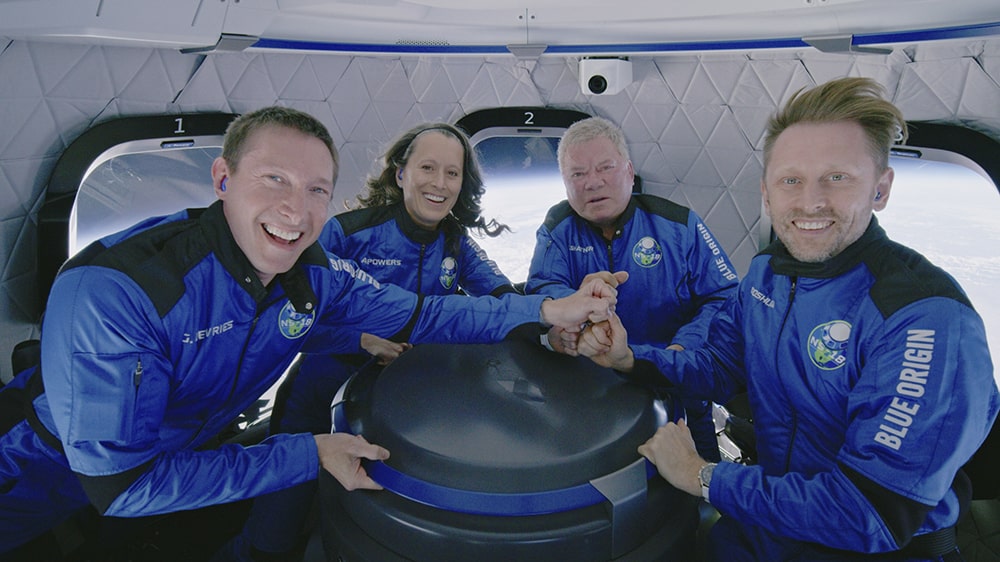
Q: You developed a bond with each of your crewmates, but one is famous for being an inspiration for the future of space travel through his role as Captain Kirk. Was it special to share this voyage with actor William Shatner, who at 90 became the oldest man to ever travel to space?
de Vries: Star Trek is a 55-year-old franchise that's inspired so many people. I think this idea of science fiction becoming fact shouldn't be lost on anybody. I've seen it in medicine. The idea that we'd have messenger RNA-based vaccines was science fiction when I was taking my Wednesday night biology seminar with John Jarvik, John Woolford and Beth Jones in 1994. Now we've got on the order of a billion people dosed with them for COVID-19. And in regard to space, now we have the person who portrayed that iconic character having gone to space himself. Science fiction becomes science fact.
Moreover, Bill has performed on stage and every size screen. He's an actor and musician and has spent his career working on expressing emotion. Being on this trip with someone like that — who could help us really think about how to articulate and express the experience ourselves — was a real privilege. It's also a very "Carnegie Mellon" thing. Engineering, math, science and technology aren't as rich without having art and expression with them. I'll take that complete experience with Audrey, Chris and Bill with me, just as much as I'll take the view looking down on Earth from the window.
Q: You're active on social media. Have you seen the memes that came from your trip?
de Vries: I think the memes are hilarious. I was expecting the red-shirt comedy ["red shirts" refers to expendable characters in episodes of Star Trek], but there's one where the engineers, Audrey and Chris, are in red shirts. Bill is in gold for the captain's uniform. And I am in a science officer's blue. That one made me really happy.
Q: You only had minutes in space. What advice do you have for making the most with the time you are given?
de Vries: I had that heightened sense of time in my mind starting from the countdown. I think I've taken that perspective back down with me to our planet, and into my relationships. The passage of time, just like the resources on Earth, feels more precious with expanded perspective.
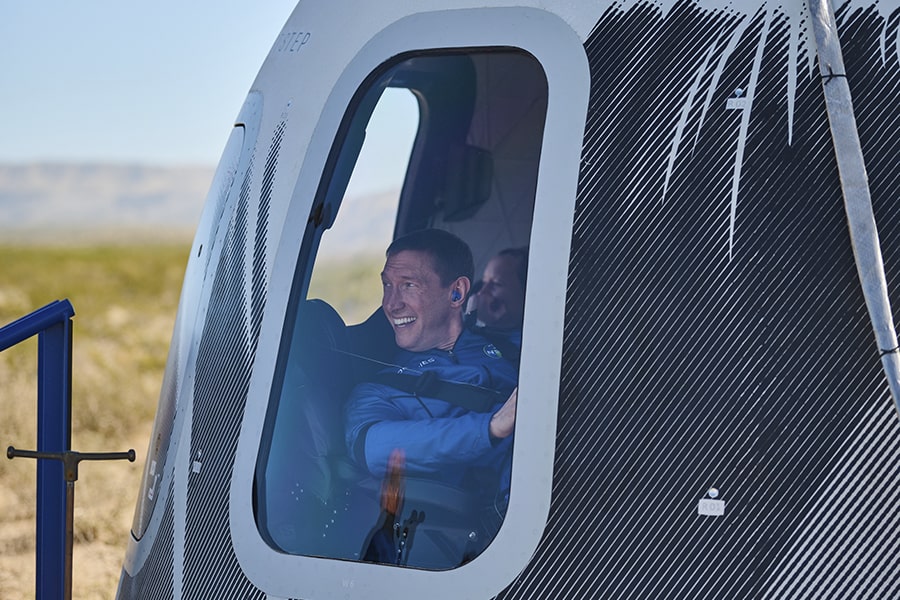
Q: Was it hard to come back?
de Vries: It was probably one of the most exciting parts of the flight. It was exciting to be in this, sort of, cannonball with windows. As you hit the atmosphere, the wind is beginning to hit the capsule. Your sense of speed is extreme. You watch the curve of the planet go back to flat and the textures change — the view on the way back was just as incredible as it was on the way up.
Q: What's next? More space?
de Vries: I honestly don't think anybody could go to space and not want to go to space more, so I would love to again.
However, what's next is advocacy.
I had the privilege of being able to afford to do this, and to have the time to do this. But this is something which is about equity and access. Between Blue Origin, Virgin Galactic and SpaceX, we're in the beginning of what could be an exponential increase in the number of people who can experience that perspective, and of how science, manufacturing, and the ways we harness and use energy can spread outside of our atmosphere for the benefit of everyone on Earth. Now I'm going to focus trying to use my experience to enable and inspire as many people as possible to be able to share that perspective, and to create those benefits.
I feel even more passionately about this than I did before the flight, and plan to make advancing the democratization of space part of my mission for the balance of my life.
Q: Finally, now that you've been to space, what is the meaning of life?
de Vries: 42!
